高三英语作文:疾病控制
流行病的防治和控制英语作文

Pandemic Prevention and Control: A GlobalImperativeIn the modern era, the threat of pandemics has become increasingly prominent, posing a significant challenge to global health and security. The rapid spread of infectious diseases across borders underscores the urgent need for effective prevention and control strategies. This essay delves into the various aspects of pandemic prevention and control, emphasizing the importance of collaboration, surveillance, vaccination, and public health education.Firstly, collaboration among nations is crucial in the fight against pandemics. The globalized world has made it easier for diseases to spread across borders, highlighting the need for a coordinated international response. International organizations like the World Health Organization (WHO) play a pivotal role in facilitating cooperation and information sharing among countries. By pooling resources and expertise, nations can jointly develop strategies to mitigate the impact of pandemics.Surveillance and early detection are also vital in pandemic prevention and control. Effective surveillancesystems allow for the timely identification and tracking of infectious diseases. This, in turn, enables authorities to quickly implement containment measures and minimize the spread of the disease. The use of modern technology, such as data analytics and artificial intelligence, can greatly enhance surveillance capabilities.Vaccination is another critical aspect of pandemic prevention and control. Vaccines are a powerful tool in the fight against infectious diseases, as they help build immunity within the population and reduce the risk of transmission. Widespread vaccination efforts have been successful in eradicating diseases like polio and significantly reducing the impact of others like measles and influenza. However, the development and distribution of vaccines can be challenging, particularly in low-resource settings. It is, therefore, essential to ensure equitable access to vaccines globally.Moreover, public health education is essential in promoting pandemic prevention and control. Educating the public about the causes, symptoms, and prevention methods of infectious diseases can help reduce the risk oftransmission. Information campaigns can also help dispel myths and misinformation surrounding pandemics, reducing panic and promoting rational responses.Finally, it is worth noting that pandemic prevention and control are not just the responsibility of governments and health organizations. Individuals and communities also play a crucial role. Simple measures like frequent handwashing, social distancing, and wearing masks can significantly reduce the spread of infectious diseases.In conclusion, pandemic prevention and control are complex and multifaceted tasks that require a concerted effort from all stakeholders. Collaboration, surveillance, vaccination, and public health education are key components of an effective response. By working together, we can mitigate the impact of pandemics and safeguard the health and well-being of people worldwide.**流行病的防治与控制:全球性的紧迫任务**在当代社会,流行病的威胁日益凸显,对全球健康与安全构成了重大挑战。
疾病控制的英语作文带翻译
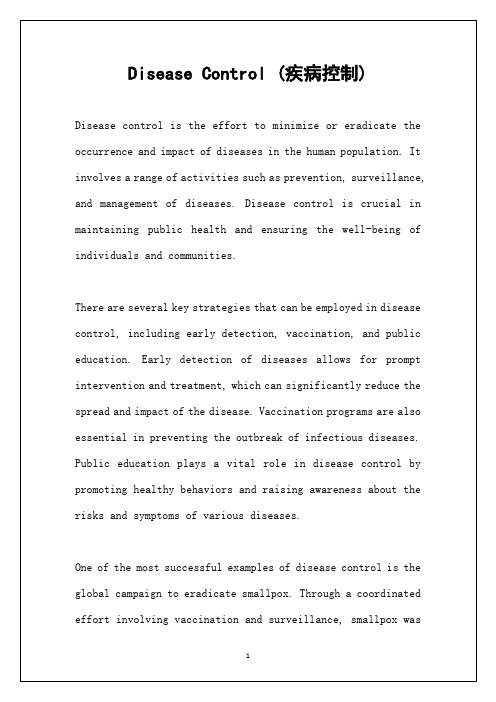
疾病控制最成功的例子之一是全球消灭天花的运动。通过疫苗接种和监测的协调努力,天花于1980年被宣布根除。这一里程碑式的成就显示了全球范围内实施疾病控制措施的有效性。
近年来,新的传染性疾病如COVID-19的出现凸显了疾病控制的重要性。 COVID-19的迅速传播凸显了需要健全的监测系统和协调的公共卫生响应。世界各国已实施措施,如旅行限制,测试和隔离以控制病毒的传播。
总之,疾病控制是公共卫生的关键组成部分。通过早期检测,疫苗接种和公众教育,可以最小化疾病的影响。消灭天花和控制COVID-19的持续努力证明了疾病控制措施的有效性。通过优先考虑疾病控制,我们可以确保个人和社区的福祉,并减轻传染病和非传染性疾病的影响。
疾病控制是努力最小化或根除人群中疾病发生和影响的努力。它涉及一系列活动,如预防,监测和管理疾病。疾病控制对于维护公共健康,确保个人和社区的福祉至关重要。
疾病控制的英语作文
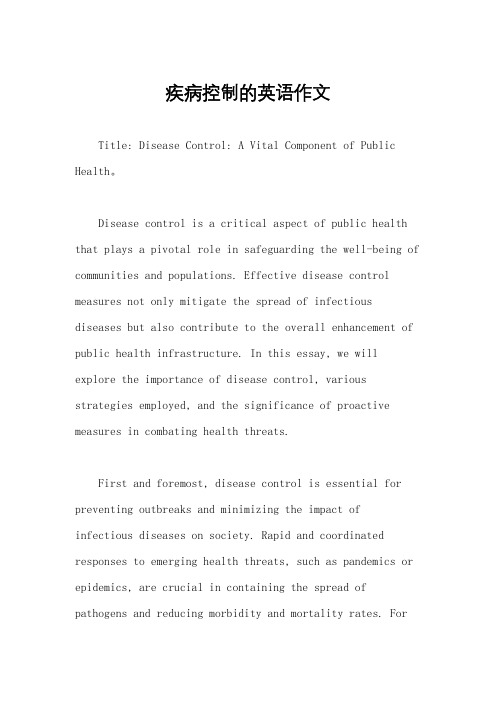
疾病控制的英语作文Title: Disease Control: A Vital Component of Public Health。
Disease control is a critical aspect of public health that plays a pivotal role in safeguarding the well-being of communities and populations. Effective disease control measures not only mitigate the spread of infectious diseases but also contribute to the overall enhancement of public health infrastructure. In this essay, we will explore the importance of disease control, various strategies employed, and the significance of proactive measures in combating health threats.First and foremost, disease control is essential for preventing outbreaks and minimizing the impact ofinfectious diseases on society. Rapid and coordinated responses to emerging health threats, such as pandemics or epidemics, are crucial in containing the spread of pathogens and reducing morbidity and mortality rates. Forinstance, during the COVID-19 pandemic, countries worldwide implemented various disease control measures, including lockdowns, mass testing, contact tracing, and vaccination campaigns, to curb transmission and protect public health.Moreover, disease control efforts encompass a wide range of strategies aimed at preventing, detecting, and responding to health threats. Prevention strategies focus on promoting public awareness, vaccination programs, and hygiene practices to reduce the risk of disease transmission. For instance, routine immunization campaigns have significantly contributed to the control and eradication of diseases such as polio, measles, and smallpox.Detection strategies involve surveillance systems that monitor disease trends, identify outbreaks, and assess the effectiveness of control measures. Timely detection allows for prompt interventions, such as quarantine measures or targeted vaccination campaigns, to contain the spread of diseases and prevent further transmission within communities.Response strategies entail coordinated efforts by health authorities, governments, and international organizations to implement control measures and provide essential healthcare services during disease outbreaks. These responses may include deploying medical personnel, establishing treatment centers, and ensuring theavailability of medical supplies and resources to affected areas.Furthermore, disease control requires collaboration and partnerships across various sectors, including healthcare, government agencies, academia, and the private sector. Multidisciplinary approaches involving epidemiologists, healthcare workers, policymakers, researchers, and community stakeholders are essential for addressing complex health challenges and achieving sustainable outcomes.In addition to infectious diseases, non-communicable diseases (NCDs) also pose significant health threats globally. Effective disease control strategies for NCDs, such as cardiovascular diseases, cancer, diabetes, andrespiratory diseases, require comprehensive public health interventions, including lifestyle modifications, health education, early detection, and access to qualityhealthcare services.Overall, disease control is fundamental to maintaining population health and well-being. By implementing proactive measures, investing in public health infrastructure, and fostering collaboration, societies can effectively mitigate the impact of diseases and build resilient health systems capable of addressing future health challenges.In conclusion, disease control is a vital component of public health that requires concerted efforts from governments, healthcare professionals, and communities. By prioritizing prevention, detection, and response strategies, societies can effectively manage infectious diseases andnon-communicable diseases, ultimately improving health outcomes and enhancing the quality of life for all individuals.。
疾病控制的英语作文高中
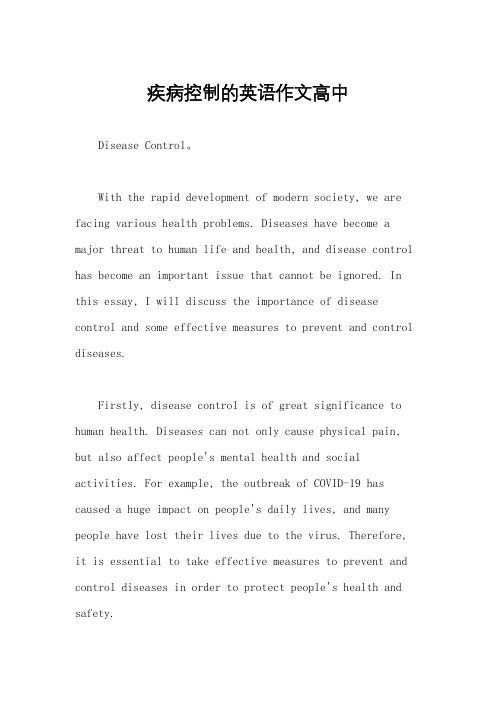
疾病控制的英语作文高中Disease Control。
With the rapid development of modern society, we are facing various health problems. Diseases have become a major threat to human life and health, and disease control has become an important issue that cannot be ignored. In this essay, I will discuss the importance of disease control and some effective measures to prevent and control diseases.Firstly, disease control is of great significance to human health. Diseases can not only cause physical pain, but also affect people's mental health and social activities. For example, the outbreak of COVID-19 has caused a huge impact on people's daily lives, and many people have lost their lives due to the virus. Therefore, it is essential to take effective measures to prevent and control diseases in order to protect people's health and safety.Secondly, there are several effective measures to prevent and control diseases. Firstly, vaccination is one of the most effective ways to prevent diseases. Vaccines can help people develop immunity to various diseases, such as polio, measles, and hepatitis. Secondly, personal hygiene is also important in disease prevention. People should wash their hands frequently, cover their mouth and nose when coughing or sneezing, and avoid close contact with sick people. Thirdly, environmental hygiene is also crucial in disease control. Public places should be cleaned and disinfected regularly to prevent the spread of germs.Moreover, disease control requires the joint efforts of individuals, governments, and society. Individuals should take responsibility for their own health and follow the guidelines and advice from health professionals. Governments should invest more in disease control and prevention, such as increasing funding for medical research and public health education. Society should also raise awareness of disease prevention and control, and support the implementation of disease control policies.In conclusion, disease control is an important issue that affects everyone's health and safety. We should take effective measures to prevent and control diseases, and work together to create a healthy and safe environment for ourselves and others.。
疾病控制和预防英语作文
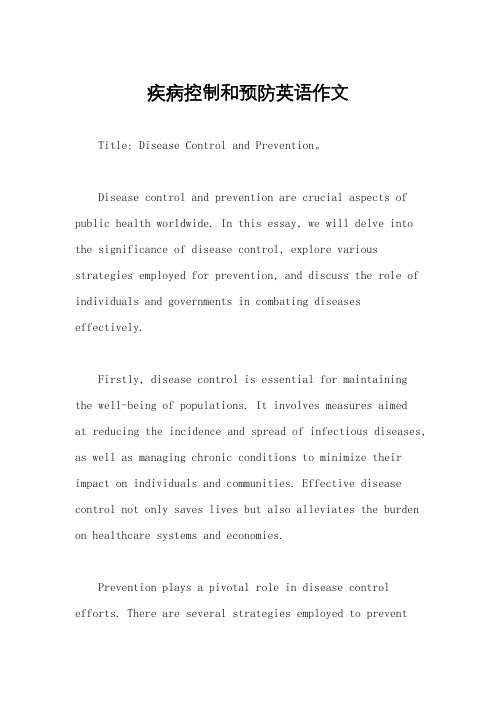
疾病控制和预防英语作文Title: Disease Control and Prevention。
Disease control and prevention are crucial aspects of public health worldwide. In this essay, we will delve into the significance of disease control, explore various strategies employed for prevention, and discuss the role of individuals and governments in combating diseases effectively.Firstly, disease control is essential for maintaining the well-being of populations. It involves measures aimedat reducing the incidence and spread of infectious diseases, as well as managing chronic conditions to minimize their impact on individuals and communities. Effective disease control not only saves lives but also alleviates the burden on healthcare systems and economies.Prevention plays a pivotal role in disease control efforts. There are several strategies employed to preventthe onset and transmission of diseases. Vaccination programs are one of the most successful prevention methods, as they bolster immunity against various infectious agents. Additionally, promoting good hygiene practices such as handwashing, sanitation, and safe food handling can significantly reduce the spread of pathogens.Furthermore, public health campaigns focusing on lifestyle modifications contribute to disease prevention. Encouraging behaviors like regular exercise, balanced diet, and smoking cessation can mitigate the risk of chronic diseases such as diabetes, cardiovascular ailments, and certain cancers. Early detection and screening programs also aid in preventing the progression of diseases by enabling timely intervention and treatment.Individuals play a crucial role in disease prevention by adopting healthy behaviors and adhering to recommended preventive measures. Personal responsibility in maintaining hygiene, seeking timely medical care, and following vaccination schedules is paramount. Moreover, individuals should stay informed about prevalent diseases and activelyparticipate in public health initiatives aimed at disease control.Governments and public health authorities bear the primary responsibility for disease control and prevention at the societal level. They formulate policies, allocate resources, and coordinate efforts to combat diseases effectively. Investment in healthcare infrastructure, research, and surveillance systems is essential for early detection, rapid response, and containment of outbreaks.International cooperation is also vital in disease control, especially in the face of global health threats such as pandemics. Collaboration between countries facilitates information sharing, resource mobilization, and coordinated responses to emerging infectious diseases. Initiatives like the World Health Organization (WHO) play a pivotal role in coordinating international efforts and providing technical assistance to member states.In conclusion, disease control and prevention are critical components of public health initiatives worldwide.Through vaccination programs, public health campaigns, and lifestyle modifications, the incidence and impact of diseases can be significantly reduced. Individual actions, governmental policies, and international cooperation are essential for effective disease control and safeguarding the health and well-being of populations globally.。
疾病控制和预防英语作文
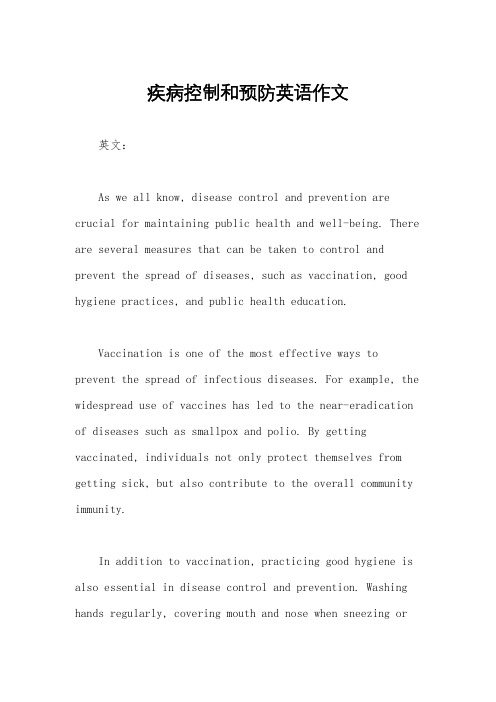
疾病控制和预防英语作文英文:As we all know, disease control and prevention are crucial for maintaining public health and well-being. There are several measures that can be taken to control and prevent the spread of diseases, such as vaccination, good hygiene practices, and public health education.Vaccination is one of the most effective ways to prevent the spread of infectious diseases. For example, the widespread use of vaccines has led to the near-eradication of diseases such as smallpox and polio. By getting vaccinated, individuals not only protect themselves from getting sick, but also contribute to the overall community immunity.In addition to vaccination, practicing good hygiene is also essential in disease control and prevention. Washing hands regularly, covering mouth and nose when sneezing orcoughing, and staying home when feeling unwell are simple yet effective ways to prevent the spread of germs and viruses. For instance, during the COVID-19 pandemic, the emphasis on handwashing and wearing masks has played a significant role in reducing the transmission of the virus.Furthermore, public health education plays a vital role in disease control and prevention. By providing accurate and timely information about diseases and their prevention, people are empowered to make informed decisions about their health. For example, campaigns promoting the importance of staying home when sick and getting tested for infectious diseases have helped raise awareness and reduce the spread of illnesses in communities.In conclusion, disease control and prevention are essential for safeguarding public health. Through measures such as vaccination, good hygiene practices, and public health education, we can effectively control and prevent the spread of diseases, ultimately leading to a healthier and safer society.中文:众所周知,疾病控制和预防对于维护公共健康和福祉至关重要。
流行病的防治与控制英语作文

流行病的防治与控制英语作文The Prevention and Control of EpidemicsIn the interconnected world we live in today, the spread of infectious diseases, or epidemics, poses a significant threat to public health and global stability. The recent COVID-19 pandemic has underscored the urgency and importance of effective epidemic prevention and control measures. This essay aims to discuss the crucial aspects of epidemic prevention and control, emphasizing the need for comprehensive strategies, global cooperation, and individual responsibility.1. Early Detection and ReportingThe first line of defense against any epidemic is early detection. This requires robust surveillance systems that can monitor health trends and quickly identify unusual patterns or clusters of illness. Once an outbreak is suspected, swift reporting to relevant health authorities is essential. Timely information sharing facilitates a rapid response, enabling health professionals to contain the spread and minimize the impact of the disease.2. Scientific Research and DevelopmentResearch plays a pivotal role in understanding the nature of the epidemic, its transmission routes, and potential treatments. Scientists work tirelessly to develop diagnostic tests, vaccines, and therapeutics that can curb the spread of the disease and treat those infected. Collaboration among researchers from different disciplines and countries accelerates this process, fostering the sharing of knowledge and resources.3. Public Health MeasuresEffective public health measures are crucial in controlling the spread of an epidemic. These include promoting hygiene practices such as regular handwashing, wearing masks in public places, and maintaining social distancing. Governments may also implement lockdowns, travel restrictions, and contact tracing to limit the movement of infected individuals and prevent further transmission. Additionally, educating the public about the epidemic and its prevention measures is vital to foster compliance and reduce fear and panic.4. Healthcare Capacity BuildingStrengthening healthcare systems is essential to manage the influx of patients during an epidemic. This includes increasing the number of hospital beds, improving access to medical equipment and supplies, and training healthcare workers to deal with infectious diseases. Ensuring a sufficient supply of essential medicines and personal protective equipment (PPE) for frontline workers is also paramount.5. Global CooperationNo country is immune to the threat of epidemics. Therefore, global cooperation is vital in preventing and controlling their spread. International organizations like theWorld Health Organization (WHO) play a crucial role in coordinating global responses, sharing information, and providing technical support and resources to affected countries. National governments should work together to implement joint strategies, share research findings, and ensure equitable access to vaccines and treatments.6. Individual ResponsibilityLastly, individual responsibility is key in preventing the spread of epidemics. Each person has a role to play in adhering to public health guidelines, such as getting vaccinated when available, practicing good hygiene, and avoiding crowded places or large gatherings during outbreaks. By taking these steps, individuals contribute to the collective effort to protect themselves, their families, and their communities. In conclusion, the prevention and control of epidemics require a multifaceted approach that encompasses early detection, scientific research, public health measures, healthcare capacity building, global cooperation, and individual responsibility. By working together, we can mitigate the impact of these devastating events and safeguard the health and well-being of our communities.。
疾病防控英语作文

疾病防控英语作文Disease prevention and control is a critical aspect of public health that ensures the well-being of communities. It involves a multifaceted approach, including education, vaccination, and hygiene practices.The role of education in disease prevention cannot be overstated. Informing the public about the importance of handwashing, safe food handling, and the benefits of a healthy lifestyle can significantly reduce the spread of infectious diseases.Vaccination is a powerful tool in controlling outbreaks and eradicating diseases. It not only protects individuals but also contributes to herd immunity, safeguarding those who cannot be vaccinated due to medical reasons.Surveillance systems play a vital role in early detection and response to disease outbreaks. Quick action can prevent the escalation of a localized issue into a widespread epidemic.Environmental factors, such as sanitation and clean water access, are foundational to disease prevention. Improving these conditions in underserved areas can lead to a marked decrease in disease transmission.International cooperation is essential in the globalfight against diseases. Sharing resources, knowledge, and strategies helps to combat diseases that do not respect borders.Technology has revolutionized disease prevention, with advancements in diagnostic tools, treatment options, and data analysis. These innovations allow for more accurate predictions and more effective interventions.Personal responsibility is key in disease prevention. Each individual can make choices that contribute to their own health and the health of their community, such as getting vaccinated and staying informed about health risks.In conclusion, disease prevention and control is a collective effort that requires the participation of individuals, communities, and governments. By working together, we can create a healthier and safer world for all.。
关于疾病防控的英文作文

关于疾病防控的英文作文Title: Disease Prevention and Control。
Disease prevention and control play crucial roles in maintaining public health and ensuring the well-being of communities worldwide. In this essay, we will explore the significance of disease prevention measures, discuss effective strategies for disease control, and highlight the importance of public awareness and cooperation in combating diseases.First and foremost, disease prevention involves taking proactive measures to reduce the risk of illness and infection. This includes promoting good hygiene practices such as regular handwashing, covering coughs and sneezes, and maintaining a clean environment. Vaccination programs also play a pivotal role in preventing the spread of infectious diseases by building immunity within populations. By vaccinating individuals against common diseases such as measles, influenza, and polio, we can significantly reducethe likelihood of outbreaks and epidemics.Furthermore, early detection and diagnosis areessential components of disease prevention and control. Timely identification of symptoms allows for prompt treatment and containment of diseases before they escalate. This underscores the importance of accessible healthcare services and robust surveillance systems to monitor disease trends and detect outbreaks swiftly. Additionally,educating the public about the signs and symptoms ofvarious illnesses empowers individuals to seek medical attention promptly, reducing the risk of transmission to others.In addition to individual-level interventions, community-wide efforts are critical for effective disease control. Public health agencies play a central role in coordinating response efforts, implementing control measures, and disseminating vital information to the public. These efforts may include quarantine measures, contact tracing, and targeted interventions to limit the spread of infectious agents. Collaboration between governmentagencies, healthcare providers, and community organizations is essential for mobilizing resources and coordinating a unified response to public health threats.Moreover, public awareness and education are key components of disease prevention and control. By promoting health literacy and raising awareness about preventive measures, we empower individuals to make informed decisions about their health and take proactive steps to protect themselves and others. Public health campaigns, educational initiatives, and community outreach programs caneffectively communicate health information and promote behavior change, fostering a culture of health and well-being within society.In conclusion, disease prevention and control are integral components of public health efforts to safeguard communities against infectious diseases and emerging health threats. By implementing comprehensive strategies that encompass vaccination, early detection, community engagement, and public education, we can mitigate the impact of diseases and promote the health and resilience ofpopulations worldwide. It is imperative that we continue to invest in robust public health infrastructure, prioritize preventive measures, and work together as a global community to address current and future health challenges effectively. Together, we can build a healthier and more resilient world for generations to come.This essay provides insights into the importance of disease prevention and control, outlining variousstrategies and emphasizing the collective responsibility of individuals, communities, and governments in safeguarding public health. Through concerted efforts and collaborative action, we can mitigate the impact of diseases and create a healthier future for all.。
疾病防控英语作文

疾病防控英语作文In today's interconnected world, the spread of diseases has become a significant challenge for global health security. The rapid pace of globalization, urbanization, and climate change has led to the emergence of new diseases and the re-emergence of old ones, posing a threat to the well-being of humanity. Therefore, the importance of disease prevention and control cannot be overstated.Disease prevention is the key to mitigating the impact of epidemics. It involves various strategies such as promoting healthy lifestyles, improving sanitation and hygiene practices, and vaccinating against communicable diseases. By fostering a culture of health and prevention, communities can reduce the risk of outbreaks and protect their members from the devastating effects of diseases.Vaccination, in particular, is one of the mosteffective tools in disease prevention. Vaccines have been credited with eradicating diseases like polio and significantly reducing the incidence of others, such as measles and pertussis. However, vaccine hesitancy and misinformation about vaccines pose significant challengesto their effective deployment. Therefore, it is crucial to educate the public about the safety and efficacy of vaccines to ensure widespread acceptance and coverage.Disease control, on the other hand, involves the rapid detection and response to outbreaks. This requires strong surveillance systems that can detect the emergence of new diseases or unusual patterns in disease occurrence. Rapid response mechanisms must be in place to isolate and treat infected individuals, trace and quarantine contacts, and implement public health measures to prevent further spread. The role of technology in disease prevention andcontrol cannot be ignored. Digital tools and big data analytics have the potential to revolutionize disease surveillance and response. By tracking patterns and trends in disease occurrence, analyzing genetic sequences of viruses, and monitoring social media for early warnings of outbreaks, technology can provide valuable insights for decision-making.However, it is important to note that disease prevention and control efforts must be inclusive and equitable. Vulnerable populations, such as the elderly,children, and those with underlying health conditions, must be prioritized in these efforts. Additionally, resource-poor countries and communities must not be left behind in the global push for disease prevention and control.In conclusion, the importance of disease prevention and control in modern society cannot be overstated. It requires a multifaceted approach that involves promoting healthy lifestyles, improving sanitation and hygiene practices, vaccinating against communicable diseases, strengthening surveillance and response systems, and leveraging technology for better decision-making. By working together and prioritizing the health and well-being of all, we can build a safer and healthier world.**疾病防控在现代社会的重要性**在当今紧密相连的世界中,疾病的传播已成为全球卫生安全面临的重大挑战。
控制病情英文作文
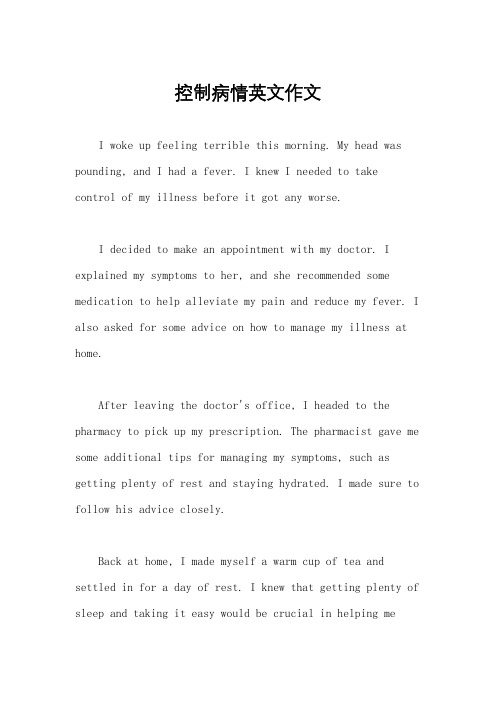
控制病情英文作文I woke up feeling terrible this morning. My head was pounding, and I had a fever. I knew I needed to takecontrol of my illness before it got any worse.I decided to make an appointment with my doctor. I explained my symptoms to her, and she recommended some medication to help alleviate my pain and reduce my fever. I also asked for some advice on how to manage my illness at home.After leaving the doctor's office, I headed to the pharmacy to pick up my prescription. The pharmacist gave me some additional tips for managing my symptoms, such as getting plenty of rest and staying hydrated. I made sure to follow his advice closely.Back at home, I made myself a warm cup of tea and settled in for a day of rest. I knew that getting plenty of sleep and taking it easy would be crucial in helping merecover from this illness.Throughout the day, I made sure to take my medication as prescribed and kept an eye on my temperature. I also made sure to eat light, healthy meals to keep my strength up.As the day went on, I could feel my symptoms starting to improve. My fever went down, and my headache began to fade. I was relieved to see that taking control of my illness was paying off.By the end of the day, I was feeling much better. I knew that by taking proactive steps to manage my illness, I had helped myself get back on the road to recovery.。
控制病情 英文作文

控制病情英文作文I remember the first time I felt out of control of my illness. It was scary and overwhelming, and I didn't know what to do. I felt like I was at the mercy of my symptoms, and it was a really tough time for me.But then I started to educate myself about my condition and how to manage it. I learned about different medications, therapies, and lifestyle changes that could help me control my symptoms. It was empowering to take control of my own health and well-being.One of the most important things I've learned is the importance of communication with my healthcare team. I make sure to keep them updated on how I'm feeling and any changes in my symptoms. This open dialogue has been crucial in finding the right treatment plan for me.In addition to medication and therapy, I've also found that self-care plays a big role in controlling my illness.Taking time for myself, practicing mindfulness, and engaging in activities that bring me joy have all been important in managing my symptoms.There are still days when I feel like my illness is controlling me, but I've come a long way in learning how to take charge of my health. It's an ongoing process, but I'm determined to keep fighting and staying in control of my illness.。
疾病防控英语作文

疾病防控英语作文In recent years, the issue of disease prevention and control has become increasingly important in the global community. 近年来,疾病预防和控制问题在全球范围内变得日益重要。
One of the key aspects of disease prevention and control is promoting public health education and awareness. 重要的疾病预防和控制方面之一是促进公众健康教育和意识。
Through public health education campaigns, individuals can learn about the importance of taking preventive measures, such as practicing good hygiene and getting vaccinated. 通过公共卫生教育活动,个人可以了解采取预防措施的重要性,例如保持良好的卫生习惯和接种疫苗。
In addition, raising awareness about the spread of infectious diseases can help people understand the risks involved and take necessary precautions to protect themselves and others. 此外,提高人们对传染病传播的认识有助于人们了解其中涉及的风险,并采取必要预防措施来保护自己和他人。
Another important aspect of disease prevention and control is the implementation of effective public health policies and strategies. 疾病预防和控制的另一个重要方面是实施有效的公共卫生政策和策略。
疾病控制的英语作文带翻译

Disease control is a critical aspect of public health that aims to prevent the spread of illnesses and promote overall wellbeing. As a high school student, I have witnessed the importance of disease control through various initiatives taken by my school and community.The first step in disease control is education. My school has implemented health education programs that teach us about the importance of hygiene, vaccination, and a balanced diet. These programs have helped me understand how to prevent the spread of diseases like the common cold, flu, and other communicable illnesses. By learning about the causes and symptoms of these diseases, I have become more aware of the need to maintain good personal hygiene and take preventive measures.In addition to education, vaccination plays a vital role in disease control. My school organizes regular vaccination drives for students, ensuring that we are protected against various diseases. The vaccination against measles, polio, and other preventable diseases has significantly reduced their prevalence in our community. As a result, I have seen a decrease in the number of students falling sick due to these diseases.Another important aspect of disease control is surveillance. My school has a robust system in place to monitor any outbreak of diseases. In case of an outbreak, immediate steps are taken to isolate the affected individuals and prevent the spread of the disease. This proactive approach has helped in controlling the spread of diseases like chickenpox and mumps in our school.Moreover, my community has also taken initiatives to promote a healthy lifestyle. Regular health camps are organized where free medical checkups and health awareness sessions are conducted. These camps have helped in early detection and treatment of various diseases, thereby reducing the burden on the healthcare system.Furthermore, the importance of mental health is also emphasized in our community. Counseling services are available for students who may be facing stress or anxiety. This has helped in creating a supportive environment where students can openly discuss their mental health concerns and seek help.In conclusion, disease control is a collective effort that requires the participation of individuals, schools, and communities. Through education, vaccination, surveillance, and promotion of a healthy lifestyle, we can effectively prevent the spread of diseases and ensure a healthier future for all. As a high school student, I am grateful for the initiatives taken by my school and community in promoting disease control and ensuring our wellbeing.疾病控制是公共卫生的一个关键方面,旨在预防疾病的传播并促进整体健康。
度米作文汇编之高三英语作文疾病控制

度米作文汇编之高三英语作文:疾病控制there are two main causes of cancer: heredity and environment. we can do nothing to change our heredity, that is, the basic physical characteristics that were passed on to us by our parents. however, we can do a great deal to control our environment, which may account for 80-90 %of all cancers.environmental pollution can be divided into two kinds: personal and impersonal. personal pollution may be defined roughly as unhealthy habits such as smoking, drinking, and eating the wrong foods. clearly, with enough will power we can control this personal environment.impersonal pollution, on the other hand, refers to those things which are beyond our individual control. one example would be industrial pollution, which is very hard to control because of the expense involved. it would be expensive in terms of profits and perhaps jobs. the american automobile industry, for example, resisted the law requiring smog-control devices because it feared the added expense would reduce profits. nevertheless, some laws protecting the environment have been quite successful in reducing pollution.。
远离疾病英文作文

远离疾病英文作文1. Stay active and exercise regularly to keep your body strong and healthy. Whether it's going for a run, hitting the gym, or simply taking a walk, physical activity is crucial in preventing diseases. So get moving and make exercise a part of your daily routine.2. Eat a balanced diet that includes plenty of fruits and vegetables. These natural foods are packed with vitamins and minerals that can boost your immune system and help fight off illnesses. Avoid processed and sugary foods as much as possible, as they can weaken your immune system and make you more susceptible to diseases.3. Get enough sleep to allow your body to rest and repair itself. Lack of sleep can weaken your immune system and make you more prone to infections. So make sure you prioritize getting a good night's sleep and establish a regular sleep schedule.4. Practice good hygiene habits, such as washing your hands regularly with soap and water. This simple act can help prevent the spread of germs and reduce your risk of getting sick. Also, remember to cover your mouth and nose with a tissue or your elbow when coughing or sneezing to prevent the spread of respiratory illnesses.5. Avoid smoking and limit your alcohol consumption. Smoking damages your lungs and weakens your immune system, making you more susceptible to respiratory infections. Excessive alcohol consumption can also weaken your immune system and increase your risk of developing certain diseases.6. Stay hydrated by drinking plenty of water throughout the day. Water helps flush out toxins from your body and keeps your organs functioning properly. It also helps maintain a healthy immune system and prevents dehydration, which can make you more susceptible to illnesses.7. Manage stress effectively, as chronic stress can weaken your immune system and increase your risk ofdeveloping various diseases. Find healthy ways to cope with stress, such as practicing mindfulness, engaging in hobbies, or seeking support from friends and family.8. Stay up to date with vaccinations and regular health check-ups. Vaccinations can prevent many diseases, and regular check-ups can help detect any potential health issues early on. Don't neglect your health and make sure to schedule regular appointments with your healthcare provider.9. Surround yourself with positive and supportive people. A strong social support system can have a positive impact on your mental and physical health. It can help reduce stress, boost your mood, and improve your overallwell-being.10. Lastly, listen to your body and take care of yourself. Pay attention to any signs or symptoms of illness and seek medical attention if needed. Remember that prevention is key, so take proactive steps to maintain good health and keep diseases at bay.。
有关疾病的英语作文
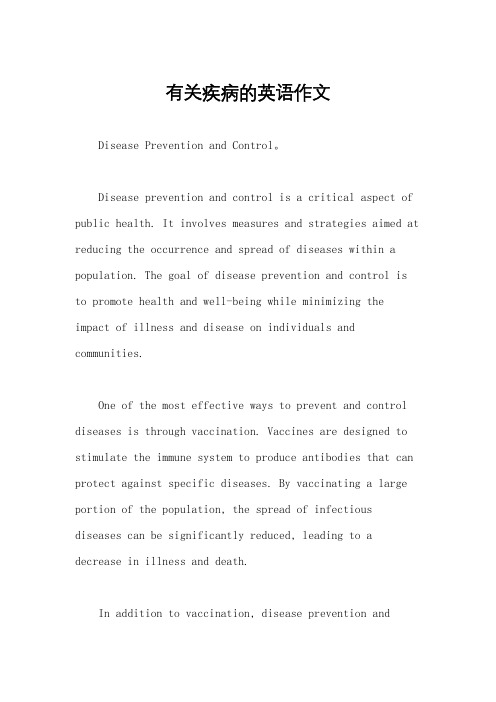
有关疾病的英语作文Disease Prevention and Control。
Disease prevention and control is a critical aspect of public health. It involves measures and strategies aimed at reducing the occurrence and spread of diseases within a population. The goal of disease prevention and control is to promote health and well-being while minimizing the impact of illness and disease on individuals and communities.One of the most effective ways to prevent and control diseases is through vaccination. Vaccines are designed to stimulate the immune system to produce antibodies that can protect against specific diseases. By vaccinating a large portion of the population, the spread of infectious diseases can be significantly reduced, leading to a decrease in illness and death.In addition to vaccination, disease prevention andcontrol also involves promoting healthy behaviors and lifestyles. This includes encouraging regular exercise, a balanced diet, and avoiding tobacco and excessive alcohol consumption. These behaviors can help reduce the risk of developing chronic diseases such as heart disease, diabetes, and cancer.Another important aspect of disease prevention and control is early detection and treatment. Screening programs can help identify diseases in their early stages when they are most treatable. For example, mammograms can detect breast cancer, and colonoscopies can detect colon cancer. Early detection allows for prompt treatment, which can improve outcomes and reduce the spread of disease.Furthermore, disease prevention and control alsoinvolves implementing public health measures such as sanitation, clean water, and vector control. These measures can help reduce the spread of infectious diseases such as cholera, malaria, and dengue fever. By improving living conditions and reducing exposure to disease-causing agents, the risk of illness and disease can be minimized.In recent years, the emergence of new infectious diseases such as COVID-19 has highlighted the importance of disease prevention and control. The rapid spread of COVID-19 around the world has demonstrated the need for effective public health measures to contain and mitigate the impact of infectious diseases. This includes measures such as travel restrictions, quarantine, and social distancing to reduce the spread of the virus.In conclusion, disease prevention and control are essential components of public health. By promoting vaccination, healthy behaviors, early detection and treatment, and public health measures, the occurrence and spread of diseases can be minimized. This not only improves the health and well-being of individuals but also contributes to the overall health of communities and populations. It is important for governments, healthcare providers, and individuals to work together to prevent and control diseases for the benefit of all.。
